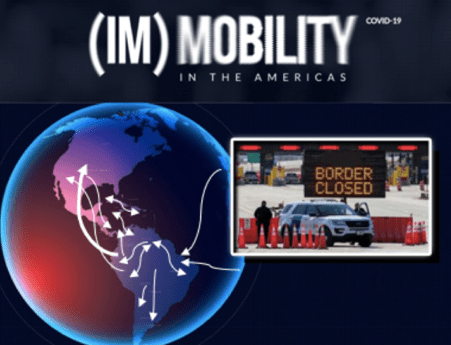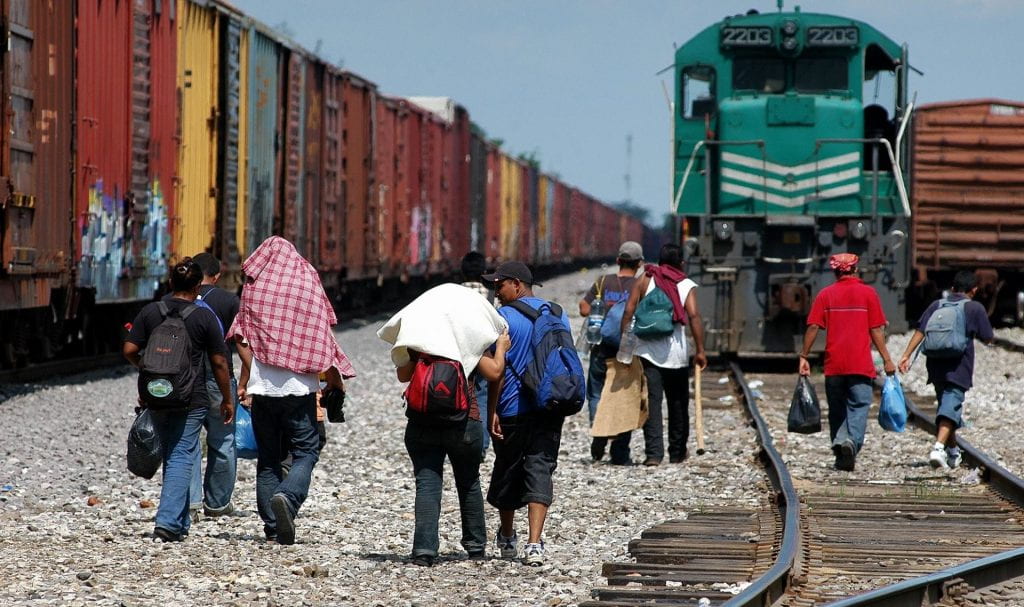By Soledad Álvarez Velasco.
In mid-March 2020, the countries of the Americas declared a health emergency, closed their borders and entered into quarantine as the first containment measures against the COVID-19 pandemic. It was in this context that 45 researchers from 19 countries in North, Central and South America and the Caribbean, all interested in migration and mobilities, came together online to ask ourselves about the situation of thousands of migrants and refugees on the continent.
While the pandemic paused our capacity to conduct ethnographic research, it did not cease our direct relation and communication with migrants and refugees. We knew that the arrival of COVID-19 had caught regional and extra-continental asylum seekers in the middle of their applications; migrant families and unaccompanied children and adolescents at border crossings; detainees in overcrowded detention centres or on deportation flights; and thousands of undocumented migrants in their precarious jobs with no possibility of stopping their workload to quarantine. We were also aware that border closures violated the right to free mobility and refuge, and that the pandemic would exacerbate nationalism by reinforcing the image of the foreigner as a ‘public charge’ or as the one who embodies the virus; elements that intensify xenophobia and racism. We got together with the intention of critically addressing these and other repercussions that COVID-19 is bringing about on the migrant lives that make up the Americas.
The project

(Im)Mobility in the Americas and COVID-19 is a new collective transnational project with an analytical focus on the tension between mobility and control and its unequal spatial repercussions. In dialogue with the geographies of mobility (Cresswell, 2006; Sheller, 2018) and critical migration and border studies (De Genova, 2017; Mezzadra and Neilson, 2013), we conceive mobility as a social and political practice embodied in migrants and refugees, adults and minors, which takes place in an unequal and differentiated manner at the national and transnational scales. Control, on the other hand, we conceive as the ways in which state institutions deploy measures to stop, divert, slow down and also speed up the movement of certain populations. Since this tension is inherent to the border regimes in the Americas, we note that it produces both forced immobilisation and new forms of mobility and that it has multi-scale spatial reverberations ranging from the individual space – directly on migrant bodies and lives – to the national and regional space.
Looking at the pandemic through the lenses of mobility and control activated this collective transnational research. Between March and May 2020, 11 national teams in the four regions of the continent collected press information on three issues: 1) risk situations faced by the migrant and refugee population; 2) state measures that have been adopted; and, 3) social responses about or against the migratory dynamic. Systematising this information allowed us to create an analysis on two scales. At the national scale, we produced a record card that, in addition to providing data on the percentage of poverty and on the national migratory pattern, gives an account of the particularities of these three themes of each of the countries that are part of this project (see the tab, ‘Situaciones por país’).
In comparing national findings, we identified 11 common situations that are taking place across the Americas. These range from border closures and hypervigilance to the suspension of the right to refuge, selective hyper-nationalism and the spiral of violence to the south as an effect of the externalisation of the U.S. border in the region (see the tab, ‘Situaciones en común’). The exacerbation of the tension between mobility and control during the pandemic largely explains these 11 situations, about which we have generated first reflective texts.
The production of this material on a national and regional scale has resulted in a digital archive that serves as a resource for research and teaching. To enable a transnational dialogue, we have translated the contents into English and Portuguese; and to give an account of how the migrant population is resisting the pandemic, we have created a polyphonic mapping section. This is a map of migrant voices of diverse ages, genders, nationalities, ethnic origins and sexual orientations, from various locations in the continent, which describe their daily experience of (im)mobility, how they face the risk of contagion, state bureaucracy, xenophobia and unemployment. It also shows how their struggle draws on solidarity, strength and hope.

What comes next
Our project is growing and today it involves 24 countries and a network of 70 investigators. But the current scenario is far more complex that when we began in March. Today, the Americas is the continent hardest hit by the pandemic, with the United States, Brazil, Mexico, Chile, Argentina, Colombia and Peru being the countries with the most cases of infection and death globally. In addition, our countries are experiencing a convergence of crises: health crisis, economic recession, social crisis of systemic racism, collapse and overt failure of state policies of protection and the crisis of control of mobility. COVID-19 has justified a perverse intersection between health and control policies, configuring a de facto state of exception in migration matters that today is giving way to a new legal architecture in migration. In recent months, several countries (such as the United States, Ecuador, Chile and Peru) are discussing or have already adopted modifications to their migration laws to openly redouble control and close national spaces.
Thus, the tension between mobility and control has heightened. In early October 2020, a battle was fought in Central America between the impetus of the new Migrant Caravan and the violent tightening of control in Guatemala and Mexico. From March to the present, U.S. deportations of migrants to their countries of origin in the Americas have not stopped. Entire populations have been confined to permanent wandering in search of a safe place to rebuild their lives. This is the case, for example, of Venezuelan migrants who have returned to Venezuela and have now had to restart regional transits. At the same time, thousands of undocumented migrant workers across the continent continue to work in hyper precarious conditions. But while dispossession and control are intensifying, so is the migrant struggle: diverse forms of care and collective solidarity have mobilised to face the pandemic, the recession and the deliberate lack of state protection.
Our project has developed a transitional analytic approach to understand the effects of current border control regimes and the migrant struggle across the Americas. This approach should politicise our discussions and the production of critical dialogues. We can no longer allow the non-defence of all those diverse bodies on the move; bodies that have been criminalised, illegalised, racialised and today are represented as deserving exposure to the risk of contagion and death because they do not belong to the national spaces in which they live or transit. The just defence of migrant life is the responsibility of all societies in the Americas – a continent formed and transformed by the incessant movement of people.
Soledad Álvarez Velasco is a postdoctoral researcher in the Department of Comparative Cultural Studies at the University of Houston. Her work focuses on undocumented transit migration, violence and the neoliberal state and the production of migratory corridors across the Americas. She is a founding member of the (Im)Mobility in the Americas and COVID-10 project.
Other MMB Latin America blogs about the impact of COVID-19 on migrants in the region include: ‘Migrants abandoned – lockdown at the Mexican-Guatemalan border’ by Ailsa Winton, ‘The desperate journey back to Venezuela’ by Alexandra Castro, and ‘Desde las trochas colombo venezolanas’ by Hugo Ramírez Arcos.
This post was commissioned by Ignacio Odriozola, MMB Alumni Ambassador. Ignacio is based in Buenos Aires and can be contacted here to discuss contributions for the MMB Latin America blog.

